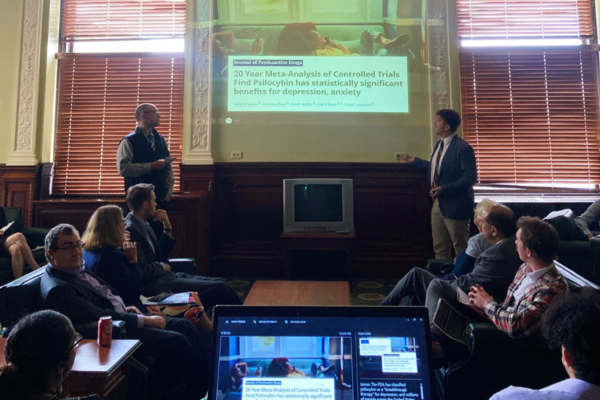
End-of-life care is evolving —but only in one direction. “There is an enormous gap in the palliative care toolbox,” says Kathryn Tucker, Special Counsel at Emerge Law Group and a founding member of the Psychedelic Bar Association as well as lead counsel in the RTT advocacy effort. While access to hospice has improved as well as medications to mitigate physical pain, that only addresses the burden of advanced illness through the lens of physical suffering. For people facing mental anguish from end of life anxiety, the option to access psychedelic therapy through the “Right to Try Act” is being denied by the DEA.
“We need a tool that brings relief for non-physical suffering,” Tucker says. And that tool is psilocybin therapy. She continues, “a single guided session brings sustained relief from anxiety and depression.” Along with other end-of-life care advocates, Tucker is leading the charge to challenge the DEA on behalf of Dr. Sunil Aggarwal, a Seattle palliative care physician, and his patients with advanced cancer. And since advocates recently forced the DEA to back down on its plan to place five new psychedelics compounds into schedule one, calls are growing for them to accede to what the law requires, allowing patients with life-threatening conditions to access to these treatments via Right to Try requests.
Here’s the genesis of the case:
May 30th, 2018: The Right to Try Act is Signed
The “Right to Try Act” was drafted to allow qualifying patients to receive access to drugs that have not yet received US Food and Drug Administration approval for broad use, including marijuana, psilocybin, and MDMA. The House voted 250 – 169 to pass the legislation, and it cleared the Senate by unanimous consent in August 2017. President Donald Trump signed the act into law in mid-2018.
May 15th, 2021: AIMS et al. v DEA Opened
In January 2021, Dr. Aggarwal, who is also the founder of the Advanced Integrative Medical Science (“AIMS”) Institute in Seattle, sought authorization from the DEA to obtain psilocybin for therapeutic use with his advanced cancer patients.
In February 2021, DEA rejected Dr. Aggarwal’s request for access, a decision that defied Right to Try laws. Rightfully, Dr. Aggarwal sought judicial review of DEA’s judgment in the United States Court of Appeals for the Ninth Circuit.
Tucker took on the case later that year and opened AIMS et al. v DEA.
September 2nd, 2021: Court Hears Argument in Landmark AIMS et al. v DEA Case
On January 31st, 2022, The court dismissed the case concluding that DEA’s action was not “final” for purposes of judicial review under 21 USC § 877. AIMS v. Garland, 21-70544 (9th Cir. January 31st, 2022). This dismissal did not address the merits of AIMS claims (patients with advanced illness have the Right to Try psilocybin under duly-enacted state and federal law), which remain strong.
February 2nd, 2022: AIMS and Dr. Aggarwal File Landmark Petition to Reschedule Psilocybin
On February 2nd, 2022, AIMS and Dr. Aggarwal filed a Petition to Reschedule psilocybin from schedule I to schedule II. The DEA has given no response to this petition. According to Tucker, “We filed a series of FOIAs to see what if anything was happening. The FOIAs were all labeled ‘complex’ enabling the DEA to dodge the statutory timeline for providing responsive documents. Accordingly we recently filed a federal case in the Southern District of Texas challenging the DEA’s unlawful pattern and practice of labeling nearly all FOIA requests as ‘complex’. That matter is still pending.”
March 31st, 2022: AIMS et al. v DEA Efforts Continue
AIMS did what the court suggested they do —ensure that the decision from the DEA was final and exhausted all administrative pathways. Despite all efforts, the final answer from DEA was the same, a denial. Now Tucker and Dr. Aggarwl are hopeful the court will expeditiously take up the case and “actually look at its merits, and not just dismiss it out of hand on a legal technicality,” as Aggarwal says in an email to Psychedelic Spotlight.
May 9th, 2022: Multiple Arrested in Protest Outside DEA HQ
In May, patients, advocacy leaders, and veterans arrived to the DEA headquarters with colored smoke bombs, violation notices, and paint. Although the police attempted to mediate, some protesters were arrested, including Dr. Bronner’s Magic Soaps CEO David Bronner and Erinn Baldeschwiler, a terminally ill patient of Dr. Aggarwal’s.
“Just to be super extra clear here. We are not asking DEA to be compassionate,” Bronner told the assembled crowd of advocates, “We’re asking them to follow established law.”
Right to Try Psilocybin: Demonstration at DEA HQ (May 9, 2022) from Reconsider on Vimeo.
July 2022: The Right to Try Clarification Act Enters the Conversation
Bipartisan and bicameral congressional lawmakers filed companion bills to clarify that federal “Right to Try” (RTT) laws allow patients with life-threatening conditions access to Schedule I drugs, including marijuana and psychedelics like psilocybin and MDMA. Senators Cory Booker (D-NJ), Rand Paul (R-KY), and Reps. Earl Blumenauer (D-OR) and Nancy Mace (R-SC) lead the charge of this legislation.
“Recent studies suggest that MDMA and psilocybin could represent an enormous advancement in mental health and psychopharmacology,” Booker said in a press release.
Looking Ahead
The Right to Try Clarification Act is a formidable step forward. If passed, patients with life-threatening conditions in at least 41 states where Right To Try laws have already been passed will have access to psilocybin therapy.
“We are fighting this battle on every front, with all haste,” Dr. Aggarwal writes, “we do not know which front will yield victory first, but the urgency of my patient’s time-sensitive medical needs demands that we take this multidimensional approach.”
Tucker echoes his optimistic urgency, signing off with actionable advice for all who are enraged by the DEA’s delay and obstruction of these duly-enacted state and federal laws: “contact your federal elected official, light up their phones and emails. Demand the enactment be swift,” she continues, “patients are running out of time.”
To arm yourself with templates and information before calling or emailing, please visit the Right to Try Psilocybin website.





